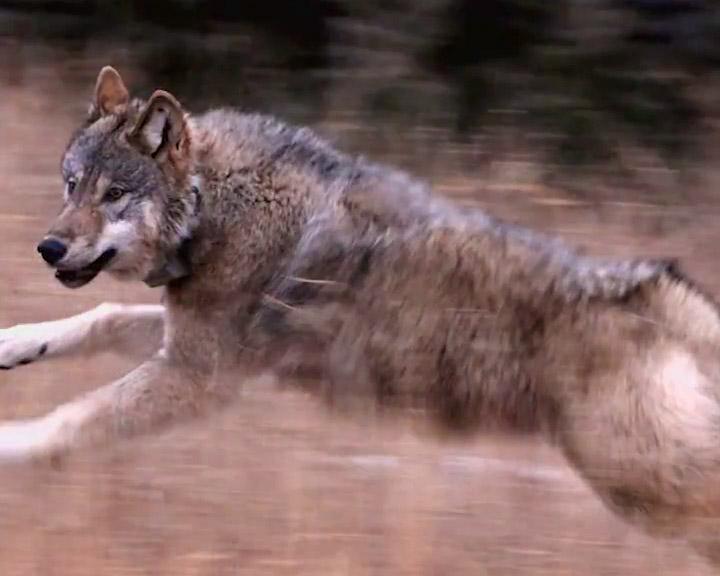
After a recent string of wolf attacks in Pitkin County, Colorado wildlife managers are considering a new strategy to keep a problematic pack away from livestock:
A buffet of roadkill or some other type of human-provided meat.
During a commission meeting last week, Colorado Parks and Wildlife director Jeff Davis suggested that his staff might use a tactic known as “diversionary feeding” to manage the Copper Creek Pack, a family group living in the mountains near Aspen.
“Diversionary feeding is something that—when we talked to our counterparts in other states—has been shown to be effective. We have considered that,” Davis said.
Wildlife officials linked the pack to four livestock attacks over the week of Memorial Day. In response, the state killed one of the pack members earlier this month, marking the first time it has lethally removed a wolf as a part of its controversial effort to restore the endangered species.
Davis told commissioners he’s hopeful the removal will deter other pack members from preying on livestock. If that doesn't work, an artificial food source could provide a distraction, but he warned it could also leave the wolves less inclined to hunt elk, deer or other wildlife.
That risk is why state wildlife managers see the tactic as a temporary solution. CPW spokesperson Travis Duncan said the state isn’t actively feeding wolves, but may offer the predators roadkill elk and deer for short periods of time. He added that wolves often scavenge carcasses in the wild, so providing dead animals would mimic a natural food source.
An effective strategy in other states
Other wolf managers have effectively used the strategy to prevent conflicts with ranchers.
In 1998, the U.S. The Fish and Wildlife Service began reintroducing Mexican gray wolves into Arizona and New Mexico. The wild population has since steadily grown to more than 250 individuals, according to the latest count conducted in 2023.
Diversionary feeding is one tool the agency uses to minimize conflicts with livestock producers. After wolves have pups, wildlife officials will sometimes leave roadkill or carnivore logs—manmade hunks of horse meat and other ingredients—outside of den sites. A recent evaluation completed by researchers at Colorado State University found the practice reduces instances of wolves preying on livestock by an estimated 44 percent.
Mike Phillips is the director of the Turner Endangered Species Fund and a wolf reintroduction expert who supported the 2020 ballot initiative mandating Colorado’s current restoration effort. In the southwest U.S., he said it’s clear that diversionary feeding has helped boost the wolf population and cooled tensions with local livestock producers. He thinks the same strategy could prove essential as wolves regain a foothold in Colorado after nearly a century-long absence.
“You buy the Copper Creek Pack some time. You buy the ranchers some time,” Phillips said.
Phillips said Colorado wildlife managers shouldn’t continue the practice indefinitely. Once the population expands and ranchers gain experience with the predators, wildlife managers should stop feeding wolves to ensure the population can subsist on natural prey without human intervention.
Little comfort for local livestock producers
The possibility of diversionary feeding comes at a critical time for Colorado’s wolf program.
The state has released a total of 25 wolves in Colorado since December 2023. Over the following year and a half, eight of the predators in the program have died, including the member of the Copper Creek Pack shot earlier this month. Meanwhile, CPW has confirmed packs have birthed new pups, but the agency hasn’t released an updated count for the state’s total wolf population.
Tom Harrington, the director of the Colorado Cattlemen’s Association and manager of the Crystal River Ranch near Carbondale, said the Copper Creek Pack is nursing a new litter of pups at a den near Snowmass.
If confirmed, the new pups would mark the latest chapter in the saga of Colorado’s most controversial wolf pack, which had its first litter of pups last year at a den near Kremmling. After the pack repeatedly preyed on nearby livestock, CPW recaptured the animals and held them in captivity until last January, when it re-released the family group in Pitkin County.
Harrington, however, isn’t pushing wildlife managers to engage in diversionary feeding. The recent attacks in May killed two calves, including one on his own ranch. He suspects those types of incidents will continue until the state admits that relocating the wolves was a mistake—and opts to remove the pack altogether.
“The whole pack is just going to have to go,” Harrington said. “If they euthanize them, kill them, put them in a sanctuary, I don’t care. That’s what’s going to have to happen.”








